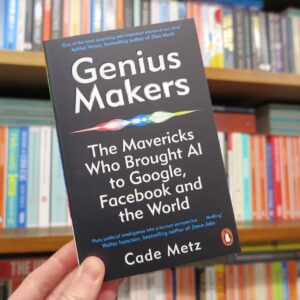Authors: Aaron Courville, Ian Goodfellow, Yoshua Bengio
“Deep Learning,” authored by Aaron Courville, Ian Goodfellow, and Yoshua Bengio, stands as a pinnacle in the realm of deep learning literature, providing a comprehensive and accessible introduction to this transformative field. This review, tailored for beginners and intermediates in the world of AI, aims to explore the merits of this book, emphasizing its pedagogical approach, coverage of essential concepts, and practical applicability for readers at various stages of expertise.
Comprehensive Coverage
The book distinguishes itself by offering an all-encompassing exploration of deep learning. It spans a wide range of topics, providing readers with a solid foundation in both the mathematical underpinnings and the conceptual framework of deep learning. From linear algebra, probability theory, and information theory to numerical computation and machine learning, the authors cover the necessary prerequisites for understanding deep learning techniques.
Educational Approach
One of the book’s notable strengths is its pedagogical approach. The authors recognized experts in the field, have crafted the content to be accessible to readers with varying levels of technical expertise. The progression of topics is designed to guide beginners through fundamental concepts while providing sufficient depth for intermediates. This makes “Deep Learning” suitable for both undergraduate and graduate students, as well as software engineers seeking to integrate deep learning into their projects.
Industry-Relevant Techniques
The book doesn’t merely focus on theoretical foundations; it bridges the gap between academia and industry by delving into deep learning techniques employed in real-world applications. Topics such as deep feedforward networks, regularization, optimization algorithms, convolutional networks, sequence modelling, and practical methodologies are covered from a practical perspective. This ensures that readers not only grasp the theory but also understand how these concepts are applied in industry settings.
Applications Across Domains
The authors extend the relevance of deep learning by exploring its applications across diverse domains. Covering natural language processing, speech recognition, computer vision, online recommendation systems, bioinformatics, and video games. The book offers a broad understanding of how deep learning is influencing various industries. This breadth of application scenarios aids readers in connecting theoretical knowledge with real-world contexts.
Mathematical Rigor
While emphasizing accessibility, the book does not compromise on mathematical rigor. It strikes a balance between providing clear explanations and delving into the mathematical foundations essential for understanding deep learning concepts. This approach ensures that readers gain a holistic understanding of the subject, preparing them for both practical implementation and further exploration of advanced topics.
Research Perspectives
“Deep Learning” goes beyond introductory material. It provides a glimpse into research perspectives, covering theoretical topics. These include linear factor models, autoencoders, representation learning, structured probabilistic models, Monte Carlo methods, the partition function, approximate inference, and deep generative models. This inclusion takes the book beyond a beginner’s guide. It transforms it into a valuable resource for those interested in pursuing research in the field.
Supplementary Material
The book’s accessibility is further enhanced by supplementary material available on its website. This additional resource serves both readers and instructors. It provides further insights, exercises, and tools to enhance the learning experience.
“Deep Learning (Adaptive Computation and Machine Learning series)” by Courville, Goodfellow, and Bengio stands as a beacon in the realm of deep learning literature. With its comprehensive coverage, pedagogical approach, industry relevance, and inclusion of research perspectives. This book becomes invaluable for beginners and intermediates in AI. As deep learning shapes the landscape of artificial intelligence, this book acts as a guiding light. It equips readers with the knowledge and skills necessary to navigate the complexities of this transformative field. Whether aiming for a career in industry or research, this book establishes a solid foundation. It serves as a gateway to the multifaceted world of deep learning.





